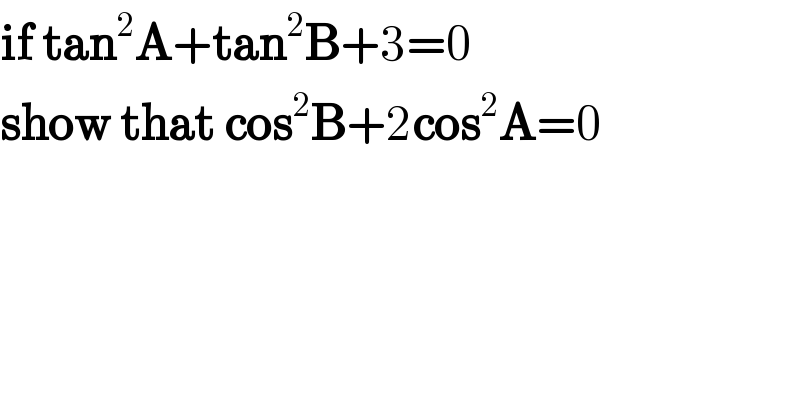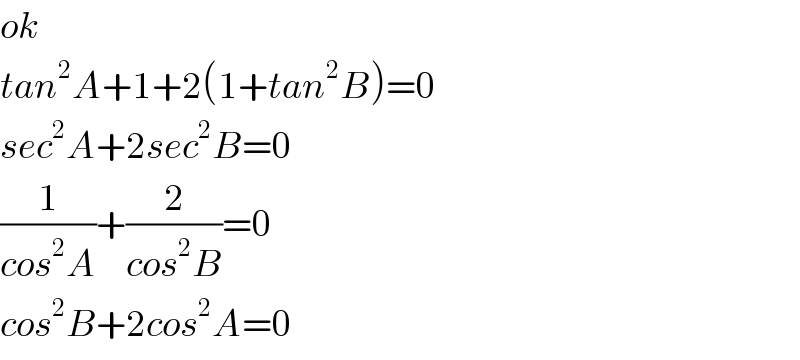Question Number 41389 by mondodotto@gmail.com last updated on 06/Aug/18

$$\boldsymbol{\mathrm{if}}\:\boldsymbol{\mathrm{tan}}^{\mathrm{2}} \boldsymbol{\mathrm{A}}+\boldsymbol{\mathrm{tan}}^{\mathrm{2}} \boldsymbol{\mathrm{B}}+\mathrm{3}=\mathrm{0} \\ $$$$\boldsymbol{\mathrm{show}}\:\boldsymbol{\mathrm{that}}\:\boldsymbol{\mathrm{cos}}^{\mathrm{2}} \boldsymbol{\mathrm{B}}+\mathrm{2}\boldsymbol{\mathrm{cos}}^{\mathrm{2}} \boldsymbol{\mathrm{A}}=\mathrm{0} \\ $$
Commented by tanmay.chaudhury50@gmail.com last updated on 06/Aug/18

$${pls}\:{check}\:{the}\:{question} \\ $$
Commented by tanmay.chaudhury50@gmail.com last updated on 07/Aug/18

$${tan}^{\mathrm{2}} {A}+{tan}^{\mathrm{2}} {B}+\mathrm{3}\:{can}\:{not}\:{be}\:{zero} \\ $$
Answered by tanmay.chaudhury50@gmail.com last updated on 07/Aug/18

$${sec}^{\mathrm{2}} {A}+{sec}^{\mathrm{2}} {B}+\mathrm{1}=\mathrm{0} \\ $$$${sec}^{\mathrm{2}} {B}=−\mathrm{1}−{sec}^{\mathrm{2}} {A} \\ $$$$\frac{\mathrm{1}}{{cos}^{\mathrm{2}} {B}}=−\left(\mathrm{1}+\frac{\mathrm{1}}{{cos}^{\mathrm{2}} {A}}\right) \\ $$$$\frac{\mathrm{1}}{{cos}^{\mathrm{2}} {B}}=−\left(\frac{\mathrm{1}+{cos}^{\mathrm{2}} {A}}{{cos}^{\mathrm{2}} {A}}\right) \\ $$$${cos}^{\mathrm{2}} {B}=−\left(\frac{{cos}^{\mathrm{2}} {A}}{\mathrm{1}+{cos}^{\mathrm{2}} {A}}\right) \\ $$$${so}\: \\ $$$${cos}^{\mathrm{2}} {B}+\mathrm{2}{cos}^{\mathrm{2}} {A} \\ $$$$=−\left(\frac{{cos}^{\mathrm{2}} {A}}{\mathrm{1}+{cos}^{\mathrm{2}} {A}}\right)+\mathrm{2}{cos}^{\mathrm{2}} {A} \\ $$$$={cos}^{\mathrm{2}} {A}\left(\mathrm{2}−\frac{\mathrm{1}}{\mathrm{1}+{cos}^{\mathrm{2}} {A}}\right) \\ $$$$={cos}^{\mathrm{2}} {A}\left(\frac{\mathrm{2}+\mathrm{2}{cos}^{\mathrm{2}} {A}−\mathrm{1}}{\mathrm{1}+{cos}^{\mathrm{2}} {A}}\right) \\ $$$$={cos}^{\mathrm{2}} {A}\left(\frac{\mathrm{1}+\mathrm{2}{cos}^{\mathrm{2}} {A}}{\mathrm{1}+{cos}^{\mathrm{2}} {A}}\right) \\ $$$$\boldsymbol{{pls}}\:\boldsymbol{{check}}\:\boldsymbol{{the}}\:\boldsymbol{{question}}… \\ $$$$ \\ $$
Commented by mondodotto@gmail.com last updated on 07/Aug/18

$$\boldsymbol{\mathrm{tan}}^{\mathrm{2}} \boldsymbol{\mathrm{A}}+\mathrm{2}\boldsymbol{\mathrm{tan}}^{\mathrm{2}} \boldsymbol{\mathrm{B}}+\mathrm{3}=\mathrm{0} \\ $$
Commented by tanmay.chaudhury50@gmail.com last updated on 07/Aug/18

$${ok} \\ $$$${tan}^{\mathrm{2}} {A}+\mathrm{1}+\mathrm{2}\left(\mathrm{1}+{tan}^{\mathrm{2}} {B}\right)=\mathrm{0} \\ $$$${sec}^{\mathrm{2}} {A}+\mathrm{2}{sec}^{\mathrm{2}} {B}=\mathrm{0} \\ $$$$\frac{\mathrm{1}}{{cos}^{\mathrm{2}} {A}}+\frac{\mathrm{2}}{{cos}^{\mathrm{2}} {B}}=\mathrm{0} \\ $$$${cos}^{\mathrm{2}} {B}+\mathrm{2}{cos}^{\mathrm{2}} {A}=\mathrm{0} \\ $$
Commented by mondodotto@gmail.com last updated on 07/Aug/18

$$\mathrm{thanx} \\ $$
Commented by tanmay.chaudhury50@gmail.com last updated on 07/Aug/18

$${its}\:{ok}… \\ $$
